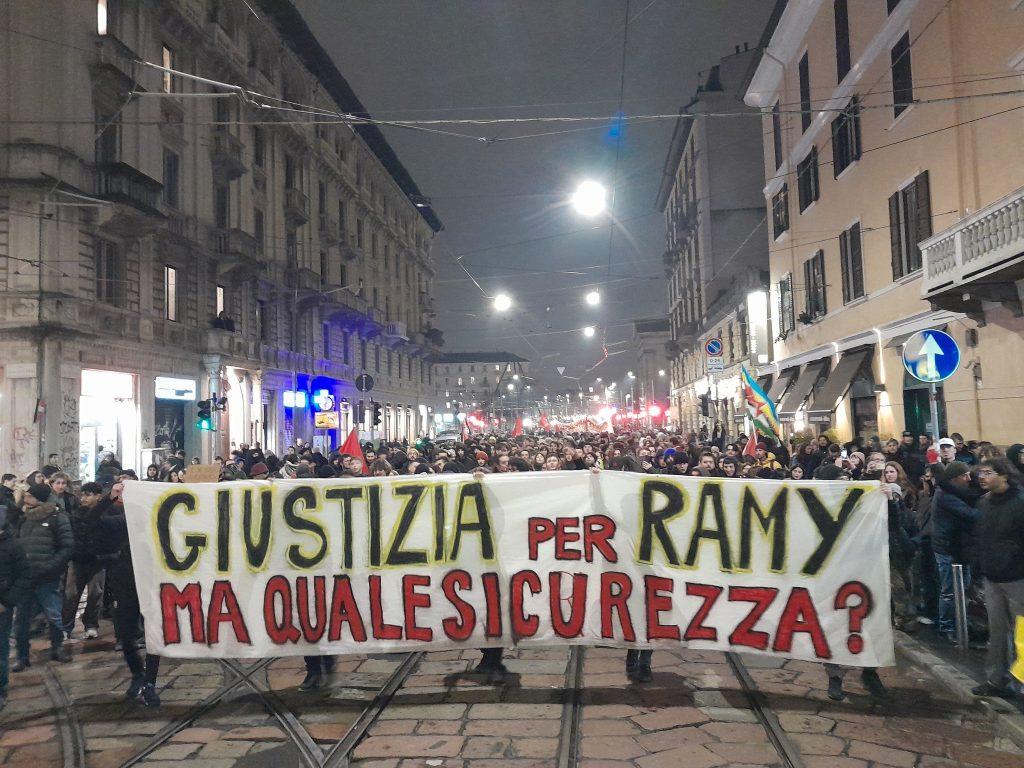A political footnote on populism: against a false alternative
by Raffaele Sciortino
“The familiar, precisely because it is familiar, remains unknown”
(G.W.F. Hegel)
The Trump victory – after the Brexit, with the evident crisis of European unity and the spreading of anti-elite mobilizations and feelings in the West – elicited two opposite and specular feedbacks in the Italian left about how read and relate to populism, especially given that the latter’s “bad side” is emerging. We sketch an ideal-typical characterization (note) of them in these provisional paper, and then try to move beyond their antithetical complementarity. It goes without saying that both sides grasp actual aspects; but, indeed, these same aspects – in their renown one-sidedness – lose the whole evolving picture, that remains unknown.
On one hand, the anti-populists dismiss the event as a right-wing phenomenon, one reducible to racism and nationalism and more or less close to fascism – basically taking for granted the loss of that part of working class that is offhandedly catalogued as “old” class composition, who is going or will be going to set itself on that background. In this regard they propose, without any substantial reconsideration, more of the same antidotes against the emerging sad passions: the struggle for human rights (therefore equalizing them to social rights), a prude anti-racism, a globalism “from below”, with liberal individualism always at heart – being it updated to the challenge of a knowledge economy that would allow the self-determination of creative intelligences, if only the existing digital platforms were to be democratized. This introduces a micropolitics and a proliferation of identities in the struggle for recognization (by whom?). Yet, as the macro dimension does not magically disappear, a substantial, blind -Europeanist sentiment prevails. That – who knows, with the country of Freedom being clouded by the new fascism – could even “critically” bring back (if it was not for a perennial, die-hard anti-German sentiment) the hated Merkel, baptized by the Nobel Prize Obama as a new anti-Trump icon – even more by considering that she already proved herself as an heroine of “refugee-ism”. In any case, the anti-populists renew, willing or not, the convergence of the left and liberal democracy in the name of Universal Rights (which, it goes without saying, a capitalism which is well-tempered by the conflict cannot but concede) typical of the democratic West (never call it with its name: imperialism) outside which there is nothing but terrible authoritarian regimes. We find here the (once progressive) globalist bourgeoisie left wing in new forms, and surely it would not be a series of “posts” (postfordism, postmodern, postindustrial, postnational, etc.) to change things.
° Others, the anti-system pro-populists, see in the phenomenon the nemesis of a left that endorsed neoliberalism and thus, in the wake of its ultimate crisis, the opening of anti-system possibilities of which the sovereignists populisms would indeed be the first expression. Even with the risk of lagging behind, in comparison to the “right-wing” populisms phenomenon and with the tendency to sugar-coat an otherwise complex reality, they have on their side a correct identification of the bottom line dynamics that link, today, the reasons of the exploited (in a broad sense) classes to the sovereign-ists and national claims as the ground of an unprecedented and renewed class struggle. But if this is their merit, then they totally misunderstand the nature of the social subjects involved in this dynamics of esistance, by turning it – illusorily – in a field of forces which is external to those processes that led the left to become what it is today – a force which is completely insider to the logic of capital, that is. These subjects are actually accredited of an already given anti-system character; that, in order to manifest itself in a consequential way, would just need an adequate direction.
The problem here becomes the one of avoidance of the inconsequential character of populism; and the answer to it means to put oneself on its same line and bringing to the extreme consequences its claims of national sovereignty, anti-Europeanism, anti-Euro, etc. Not only, therefore, an excessively linear reading of the ongoing processes is given, but there is an illusion of being able to play a role (as a “true” left?) that in the end is a matter of set oneself at the rear of sectors of degrading bourgeoisie who, believing to act in their own interest, end up supporting infinitely more powerful players (for Europe: the US who would benefit from a potential end of the euro currency).
° Actually, in order to start setting a way out from the abovementioned specular opposition, it is good to not lose sight of the fact that the internalization of the capitalist/neo-liberal diktat does not only work for the political leftist representatives; but that it deeply involved, in the phase of ascending financialization, those very subjects that today, in the crisis, seek new answers outside that left. Without, in regard to this, representing an “outer space” in front of real subsumption processes, of neo-industrialization of businesses, of real and symbolical submission to the integrated spectacle sub forma of fictitious capital. On the contrary the new proletariat (which includes considerable shares of middle class), for being a complete insider of the Capital – differently from the old workers’ movement who kept its own separate identity, a relative “outerness” of its own that first allowed to keep alive the workers’struggle/capitalist development dichotomy, but that was then devoured from the very achievements it won – for this positioning in regards to the capital finds itself increasingly morphed now into a “citizen” who goes unheard by the power (the good variation of populism) then into a “superfluous” (bad variation) individual, desperately seeking so to speak neo-reformist and neo-sovereignistes, solutions, which are ambivalent and often “dirty and bad”. That these agendas present themselves as “anti-system” populism is telling about how, objectively, the margins of tolerance of total capital have been restricted in regard to any detour by the subjects from the scheduled roadmap; but it is also telling about its crisis of social and political negotiation ability.
° The root of this ambivalence, open to opposite outcomes, lies precisely in the objective standing of the proletariat within the current production system – that destroyed or subsumed the still autonomous spaces of material and symbolic reproduction of social life.
Such an insider character (which is combined – in the West – with a relative margin of economic reserves even facing an increasingly bleaker future) produces a contradictory situation: the solutions (which are sought after in order to exit a crisis which is not merely an economic one but also an epistemological one) go in the direction of a “common” that, though being already a critique of unrestrained individualism, it is still entirely within this life and production system (which is
symbolized, not by any chance, by the nation) – which makes it a harbinger of risky contrasts between a “us” and a “you” not along class lines, but of another kind. And it is like if, in order to take back their communal nature (a meta-historical one, not a mythical essentialist one) the proletariat should cross till the end through the community – which is fictional – but not any lesser real because of this – of total-spectacular Capital. And yet that “we” can host a very wide variety of subjects united by a single social condition: an actually proletarized workforce, which is rigidly dependent on who moves the levers of great capital – even when they let you believe that you enjoy economic or cognitive autonomy- and an expropriated life. And also a crescent humanity – which is ·irreparably superfluous for the system being not even good as an industrial reserve army but being a veritable overflow, unuseful even as a mass in order to blackmail those who work – starts to stay within it. Above all, here emerges the feeling of not being able to live like before, that some kind of disruption becomes necessary.
° The political question, in the light of all this, it is not about how avoiding the slipping and/or the inconsequential character of populism.
Because, by developing itself on the us/you axis (even where the “you”, in the beginning, appears to include only the elites), it is assumed not only to be inconsequential in its anti-establishment claims; but also to bring sooner or later to a race to the bottom and to support the growing rivalries between nations. But the crux is that it is not unavoidable for it to drag with it in this drift the subjects, or all the subjects, that acknowledge themselves in it or cross it as a claim of resistance.
The useful question – from a point of view which is actually antagonist to the system – is another: which are the condition for populism to be overcame and decomposed? How will it enter in contradiction not with itself, but with the claims and the subjects? How to separate in the yet timid requests for power the “sovereignist” (which is, after all, an attempt to gain back power on one’s own life) dimension from the nationalist one? These are complex yet unavoidable issues on which, perhaps in a not so distant future, a crux will be given: what are the friends of the people?
Only with these questions well in mind it is possible and necessary to get one’s own hands dirty, in order to overturn these contradicting dynamics. The populisms stands at the beginning of a process which would not be a linear one at all, given that the global crisis is about to enter its second hellish circle – in an anticapitalist sense, that is the only one of interest to us. It is good to keep in mind that, in the first place, it is not a matter of somebody’s tactical abilities or about setting up today some “alternative direction”. Above all, it is a matter of most deep economic and social upheavals, of a breakdown of the system and of the classes’ positioning within it; and, first of all, of the constitution of a wide antagonist subject able to attract (or to neutralize) through its struggle those strata who would look elsewhere for other, ominous, landings. Only on this basis a non-fringe political intervention can be given, one able to relate itself to topics and forms of effective reality and not to its imagination. An intervention that needs a tendency, even a programmatic one, able to keep a distance – without extremisms but abruptly and on all levels – from the left-right spectrum as it is defined by bourgeoise politics. We want to draw the friend/emeny line ourselves and not acquire it from our enemies.
November 30, 2016
Ti è piaciuto questo articolo? Infoaut è un network indipendente che si basa sul lavoro volontario e militante di molte persone. Puoi darci una mano diffondendo i nostri articoli, approfondimenti e reportage ad un pubblico il più vasto possibile e supportarci iscrivendoti al nostro canale telegram, o seguendo le nostre pagine social di facebook, instagram e youtube.


















